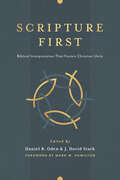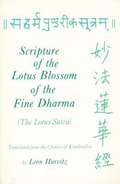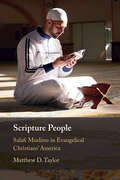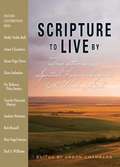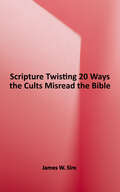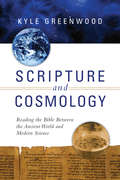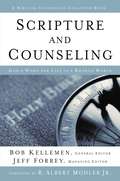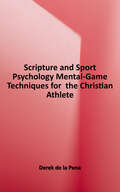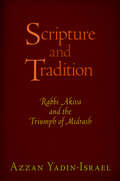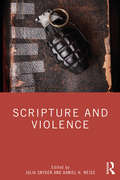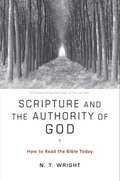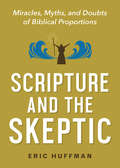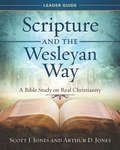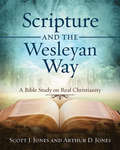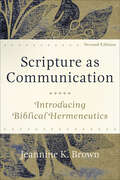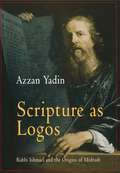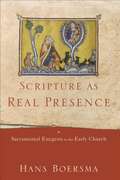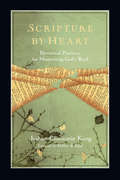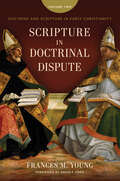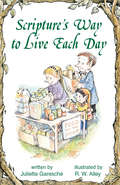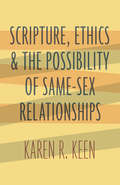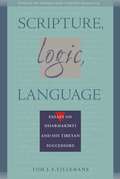- Table View
- List View
Scripture First: Biblical Interpretation that Fosters Christian Unity
by J. David Stark Daniel B. OdenHow does Scripture read Scripture, and can the church follow that lead?Scripture or tradition? The things of God or the things of men? It’s easy, especially in the long shadow of the Reformation, to pit Scripture against tradition as enemies. After all, the goal of orienting one’s faith to the Bible alone can be so alluring.But the Bible itself suggests there is a fundamental unity between Scripture and the tradition it embodies. Rightly appreciating this unity can set the stage for more faithful and robust engagement with Scripture. Today’s polarized world needs thoughtful Christians who can reasonably consider their faith in light of what the Bible actually says.Scripture First examines where tradition comes from and how you can avoid trivial proof texting. Discover how the Old and New Testament can serve as a living and active resource for Christian life, and how God continues to leads his people as they engage his Word.
Scripture Of The Lotus Blossom Of The Fine Dharma: The Lotus Sutra
by Stephen F. Teiser Leon HurvitzOriginally published in 1976, Leon Hurvitz's monumental translation of the Lotus Sutra is the work scholars have preferred for decades. Hailed by critics as an "extraordinary" and "magnificent" achievement, Hurvitz's translation is based on the best known Chinese version of the text and includes passages of the original Sanskrit that were omitted from the Chinese. <P><P> Beloved for its mythology and literary artistry, the Lotus Sutra is one of the most popular and influential texts of Mahayana Buddhism, asserting that there is only one path to enlightenment, the bodhisattva path, and that all followers without exception can achieve supreme awakening. The text argues that the Buddha cannot be delimited by time and space and that a common intent underlies the diversity of Buddhist teachings. Through parables of the burning house, the wayward son, and other tales that have come to be known throughout East Asia, the sutra skillfully concretizes abstract religious concepts and clarifies bold claims about the Buddhist tradition. Urging devotees to revivify doctrine through recitation and interpretation, the sutra powered an organic process of remaking that not only kept its content alive in the poetry and art of premodern Asia but also introduced new forms of practice and scriptural study into contemporary Buddhism. Stephen F. Teiser's foreword addresses this vital quality of the sutra, discusses its background, and reflects on the enduring relevance of Hurvitz's critical work.
Scripture People: Salafi Muslims in Evangelical Christians' America
by Matthew D. TaylorOn 9/11, many Americans were introduced to an Islamic movement called Salafism, the theological strand that includes Al Qaeda. Since then, Salafism, an important and popular movement in global Islam, has frequently been disparaged as 'Radical Islam' or 'Islamic fundamentalism.' Scripture People is the first book-length study of the embattled American Salafi movement and the challenges it has faced post-9/11. Matthew D. Taylor recounts how these so-called “Radical Muslims” have adopted deeply rooted American forms of religious belonging and values. Through comparison with American Evangelical Christianity, informed by his own Evangelical background and studies, Taylor explores the parallel impulses, convergent identities, and even surprising friendships that have emerged between Salafis and Evangelicals in America. Offering an entry point for understanding the dynamics and disagreements among American Muslims, Taylor's volume upends narratives about 'Radical Islam' by demonstrating how Salafi Muslims have flexibly adapted to American religious patterns in the twenty-first century.
Scripture To Live By
by Arron ChambersA Simon & Schuster eBook. Simon & Schuster has a great book for every reader.
Scripture Twisting: 20 Ways The Cults Misread the Bible
by James W. SireHow often have you encountered some bizarre doctrine only to be stunned to hear a Bible verse quoted to support it? With new religious cults springing up almost daily and old ones growing rapidly, this is more and more common. How are they seemingly able to twist Scripture to mean something orthodox Christians have never believed it to mean in two thousand years? James Sire, author of The Universe Next Door and How to Read Slowly, has isolated twenty separate kinds of reading errors which are characteristically made by cultists as they interpret the Bible. He covers the full range from simple misquotation to complex argumentation which links one slightly eccentric interpretation to another, mixes in a few orthodox readings and ends with a conclusion totally foreign to the biblical world view. Sire also handles twisted translation, over specification, virtue by association, ignoring the context, and other flawed interpretations. A book to help us all become better readers of the Scriptures.
Scripture and Cosmology: Reading the Bible Between the Ancient World and Modern Science
by Kyle GreenwoodChristians often claim to hold a biblical worldview. But what about a biblical cosmos view? From the beginning of Genesis we encounter a vaulted dome above the earth, a "firmament," like the ceiling of a planetarium. Elsewhere we read of the earth sitting on pillars. What does the dome of heaven have to do with deep space? Even when the biblical language is clearly poetic, it seems to be funded by a very different understanding of how the cosmos is put together. As Kyle Greenwood shows, the language of the Bible is also that of the ancient Near Eastern palace, temple and hearth. There was no other way of thinking or speaking of earth and sky or the sun, moon and stars. But when the psalmist looked at the heavens, the delicate fingerwork of God, it evoked wonder. Even today it is astronomy and cosmology that invoke our awe and point toward the depths of divine mystery. Greenwood helps us see how the best Christian thinkers have viewed the cosmos in light of Scripture—and grappled with new understandings as science has advanced from Aristotle to Copernicus to Galileo and the galaxies of deep space. It's a compelling story that both illuminates the text of Scripture and helps us find our own place in the tradition of faithful Christian thinking and interpretation.
Scripture and Counseling: God's Word for Life in a Broken World
by R. Albert Mohler Jr. Bob Kellemen Jeff ForreyToday we face a tremendous weakening of confidence in the Bible. This is just as true for the pastor offering counsel in his office as it is for the person in the pew talking with a struggling friend at Starbucks or the small group leader who is unsure of what to say to a hurting group member. We need to regain our confidence in God’s Word as sufficient to address the real life issues we face today. We need to understand how the Bible equips us to grow in counseling competence as we use it to tackle the complex issues of life. Scripture and Counseling is divided into two sections of nine chapters each: Part One helps readers to develop a robust biblical view of Scripture’s sufficiency for “life and godliness” leading to increased confidence in God’s Word. Part Two assists readers in learning how to use Scripture in the counseling process. This section demonstrates how a firm grasp of the sufficiency of Scripture leads to increased competence in the ancient art of personally ministering God’s Word to others. Part of the Biblical Counseling Coalition series, Scripture and Counseling brings you the wisdom of twenty ministry leaders who write so you can have confidence that God’s Word is sufficient, necessary, and relevant to equip God’s people to address the complex issues of life in a broken world. It blends theological wisdom with practical expertise and is accessible to pastors, church leaders, counseling practitioners, and students, equipping them to minister the truth and power of God’s word in the context of biblical counseling, soul care, spiritual direction, pastoral care, and small group facilitation.
Scripture and Sport Psychology: Mental-Game Techniques for the Christian Athlete
by Derek de la PeñaThis is the first book to combine principles from the Holy Bible and sports psychology literature into a straightforward and practical guide for improving mental skills and athletic performance. Author Dr. Derek de la Peña earned a Ph.D. at the University of Florida in 2001 where he served as the mental-game consultant for the NCAA men's golf national champion Florida Gators. He has since dedicated his knowledge and skills as a mental game and performance consultant to helping athletes of all ages and levels reach their full potential. Without a strong mental game, athletes limit their ability to perform optimally. Drawing from enlightening parallels from the Bible and sports psychology research, the author provides effective techniques to enhance the mental fortitude necessary for peak performance. Topics include: - Building Confidence - Fueling Purpose and Motivation - Dealing with Adversity - Being a Team Player - Playing in "The Zone" Scripture and Sport Psychology: Mental-Game Techniques for the Christian Athlete is an invaluable resource of principles and practical ways for athletes of all ages to master the art of effective thinking from a Christian perspective.
Scripture and Tradition: Rabbi Akiva and the Triumph of Midrash (Divinations: Rereading Late Ancient Religion)
by Azzan Yadin-IsraelThe earliest rabbinic commentary to the Book of Leviticus, the Sifra, is generally considered an exemplum of Rabbi Akiva's intensely scriptural school of interpretation. But, Azzan Yadin-Israel contends, the Sifra commentary exhibits two distinct layers of interpretation that bring dramatically different assumptions to bear on the biblical text: earlier interpretations accord with the hermeneutic principles associated with Rabbi Ishmael, the other major school of early rabbinic midrash, while later additions subtly alter hermeneutic terminology and formulas, resulting in an engagement with Scripture that is not interpretive at all. Rather, the midrashic terminology in the Sifra's anonymous passages is part of what Yadin-Israel calls "a hermeneutic of camouflage," aimed at presenting oral traditions as though they were Scripture-based injunctions.Scripture and Tradition offers a radical rereading of the Sifra and its authorship, with far-reaching ramifications for our understanding of rabbinic literature as a whole. Using this new understanding of the Sifra as his starting point, Yadin-Israel demonstrates a two fold break in the portrayal of Rabbi Akiva: hermeneutically, the sober midrashist who appeared in earlier rabbinic sources is transformed into an inspired, oracular interpreter of Scripture in the Babylonian Talmud; while the biographically unremarkable sage is recast as a youthful ignoramus who came to Torah study late in life. The dual transformations of Rabbi Akiva—like the Sifra's hermeneutic of camouflage—are motivated by an ideological shift toward a greater emphasis on scriptural authority and away from received traditions, an insight that sheds new light on the vexing question of midrash and oral tradition in rabbinic sources. Through this close examination of a notoriously difficult text, Scripture and Tradition recovers a vital piece of the history of Jewish thought.
Scripture and Violence
by Julia Snyder; Daniel H. WeissIn the public sphere, it is often assumed that acts of violence carried out by Muslims are inspired by their religious commitment and encouraged by the Qur’an. Some people express similar concerns about the scriptures and actions of Christians and Jews. Might they be right? What role do scriptural texts play in motivating and justifying violence in these three traditions? Scripture and Violence explores the complex relationship between scriptural texts and real-world acts of violence. A variety of issues are addressed, including the prevalent modern tendency to express more concern about other people’s texts and violence than one’s own, to treat interpretation and application of scriptural passages as self-evident, and to assume that the actions of religious people are directly motivated by what they read in scriptures. Contributions come from a diverse group of scholars of Islam, Judaism, and Christianity with varying perspectives on the issues. Highlighting the complex relationship between texts and human actions, this is an essential read for students and academics studying religion and violence, Abrahamic religions, or scriptural interpretation. Scripture and Violence will also be of interest to researchers working on religion and politics, sociology and anthropology of religion, socio-political approaches to scriptural texts, and issues surrounding religion, secularity, and the public sphere. This volume could also form a basis for discussions in churches, synagogues, mosques, interfaith settings, and government agencies.
Scripture and the Authority of God: How to Read the Bible Today
by N. T. Wright"But what does scripture say?" That question has echoed through a thousand debates in the life of the worldwide church. All churches have officially endorsed strong statements about the centrality of scripture and its authority in their mission, life, doctrine, and discipline. But there is no agreement on what this might mean or how it might work in practice. Individuals and churches struggle with how to respond to issues such as war, homosexuality, and abortion, and especially how to interpret biblical passages that discuss these topics. These disagreements often serve to undermine our confidence in the authority of the Bible. Bishop and Bible scholar N. T. Wright delivers a new model for how to understand the place of scripture and God's authority in the midst of religious confusion. Wright gives new life to the old, tattered doctrine of the authority of scripture, delivering a fresh, helpful, and concise statement on how to read the Bible today, restoring scripture as a place to find God's voice. In this revised and expanded edition of the previously titled book The Last Word, Wright provides two case studies that delve into what it means to keep Sabbath and how Christians can defend marital monogamy. These studies offer not only bold biblical insights but also showcase Wright's new model for how to interpret scripture and restore its role as the church's main resource for teaching and guidance. Removing the baggage that the last 100 years of controversy and confusion have placed on this doctrine, Wright renews our confidence in the Bible and shows how it can once again serve as the living Word of God for our lives.
Scripture and the Authority of God: How to Read the Bible Today
by N. T. WrightIn Scripture and the Authority of God: How to Read the Bible Today, Widely respected Bible and Jesus scholar, N. T. Wright gives new life to the old, tattered doctrine of the authority of scripture, delivering a fresh, helpful, and concise statement on the current “battles for the Bible,” and restoring scripture as the primary place to find God’s voice.In this revised and expanded version of The Last Word, leading biblical scholar N. T. Wright shows how both evangelicals and liberals are guilty of misreading Scripture and reveals a new model for understanding God’s authority and the Bible.
Scripture and the Skeptic: Miracles, Myths, and Doubts of Biblical Proportions
by Eric HuffmanThe Bible is the best-selling, most widely read, and most quoted book in history. It is also misunderstood, misquoted, and fiercely debated. If, as Christians believe, the Bible is the Word of God, why is it so complex and difficult to interpret in parts, yet simple enough for even children to understand in others?In Scripture and the Skeptic Eric Huffman, author of 40 Days of Doubt, helps readers understand and cope with confusion about the Bible and provides answers to questions by reframing it as a perfect and seamless story. Huffman illustrates how the Bible, even the parts some consider ungodly, presents the beautiful story that God intended to tell. Through storytelling from his own experiences and his take on Bible stories, Huffman helps readers understand the Bible by interpreting the entire book through the lens of Jesus’s life, death, and resurrection. He shows how every part of the Bible is either crying out for Jesus, witnessing his incarnation, or responding in the aftermath of his resurrection. Readers discover how to trust the Bible as God’s beautiful and perfect salvation story. Includes questions with each chapter for personal reflection or group study. From the author of 40 Days of Doubt: Devotions for the Skeptic.
Scripture and the Wesleyan Way Leader Guide: A Bible Study on Real Christianity (Scripture and the Wesleyan Way)
by Scott J. Jones Arthur D. JonesThe Bible was central to John Wesley’s faith and the Christian movement he founded. In Scripture and the Wesleyan Way, you will discover a Wesleyan approach to the Bible and the Christian life through a Bible study using Wesley’s own words.In this study, authors Scott and Arthur Jones use John Wesley’s sermons to illuminate the Bible passages at the heart of Wesley’s understanding of what it means to be a real Christian. Each chapter explores a key Scripture text and one of Wesley’s sermons on it. Through their insightful and engaging study, Bishop Jones and his son Arthur show how the teachings of Wesley address questions that many of us in the twenty-first century still struggle with today.The Leader Guide contains everything needed to guide a group through the eight-week study including session plans, activities, and discussion questions, as well as multiple format options.
Scripture and the Wesleyan Way: A Bible Study on Real Christianity (Scripture and the Wesleyan Way)
by Scott J. Jones Arthur D. JonesThe Bible was central to John Wesley’s faith and the Christian movement he founded. In Scripture and the Wesleyan Way, you will discover a Wesleyan approach to the Bible and the Christian life through a Bible study using Wesley’s own words.In this study, authors Scott and Arthur Jones use John Wesley’s sermons to illuminate the Bible passages at the heart of Wesley’s understanding of what it means to be a real Christian. Each chapter explores a key Scripture text and one of Wesley’s sermons on it. Through their insightful and engaging study, Bishop Jones and his son Arthur show how the teachings of Wesley address questions that many of us in the twenty-first century still struggle with today.Chapters include: What is the Bible’s Message? Am I a Real Christian? How Can I Be Saved? Do I Have to Obey the Law? Am I a Sinner? Why is the Christian Life Not Easier? Am I Going to Heaven? What about My Money?Additional components for an eight-week study include a DVD featuring Scott and Arthur Jones and a comprehensive Leader Guide. As readers study the Bible with John Wesley, they will encounter his call to live a real Christian life and be inspired to respond to this call with faith and boldness.John Wesley discovered a challenging yet hopeful message in the Bible, which profoundly shaped his personal life and the Methodist movement he founded. As you study the Bible with John Wesley, you will hear his call to live a real Christian life and be inspired to respond to this call with faith and boldness.
Scripture as Communication: Introducing Biblical Hermeneutics
by Jeannine K. BrownThis guide to the theory and practice of biblical hermeneutics emphasizes the communicative nature of Scripture, proposing a communication model as an effective approach to interpreting the Bible. Now revised and updated.
Scripture as Logos: Rabbi Ishmael and the Origins of Midrash (Divinations: Rereading Late Ancient Religion)
by Azzan YadinThe study of midrash—the biblical exegesis, parables, and anecdotes of the Rabbis—has enjoyed a renaissance in recent years. Most recent scholarship, however, has focused on the aggadic or narrative midrash, while halakhic or legal midrash—the exegesis of biblical law—has received relatively little attention. In Scripture as Logos, Azzan Yadin addresses this long-standing need, examining early, tannaitic (70-200 C.E.) legal midrash, focusing on the interpretive tradition associated with the figure of Rabbi Ishmael.This is a sophisticated study of midrashic hermeneutics, growing out of the observation that the Rabbi Ishmael midrashim contain a dual personification of Scripture, which is referred to as both "torah" and "ha-katuv." It is Yadin's significant contribution to note that the two terms are not in fact synonymous but rather serve as metonymies for Sinai on the one hand and, on the other, the rabbinic house of study, the bet midrash. Yadin develops this insight, ultimately presenting the complex but highly coherent interpretive ideology that underlies these rabbinic texts, an ideology that—contrary to the dominant view today—seeks to minimize the role of the rabbinic reader by presenting Scripture as actively self-interpretive.Moving beyond textual analysis, Yadin then locates the Rabbi Ishmael hermeneutic within the religious landscape of Second Temple and post-Temple literature. The result is a series of surprising connections between these rabbinic texts and Wisdom literature, the Dead Sea Scrolls, and the Church Fathers, all of which lead to a radical rethinking of the origins of rabbinic midrash and, indeed, of the Rabbis as a whole.
Scripture as Real Presence: Sacramental Exegesis in the Early Church
by Hans BoersmaThis work argues that the heart of patristic exegesis is the attempt to find the sacramental reality (real presence) of Christ in the Old Testament Scriptures. Leading theologian Hans Boersma discusses numerous sermons and commentaries of the church fathers to show how they regarded Christ as the treasure hidden in the field of the Old Testament and explains that the church today can and should retrieve the sacramental reading of the early church. Combining detailed scholarly insight with clear, compelling prose, this book makes a unique contribution to contemporary interest in theological interpretation.
Scripture by Heart: Devotional Practices for Memorizing God's Word
by Joshua Choonmin KangWhy memorize the Bible? In our information-saturated society, with so many details to take in, the idea of memorizing Scripture can seem overwhelming—like one more task on a checklist. But pastor Joshua Choonmin Kang has discovered what happens when we do spend time memorizing God's Word: we grasp a larger, truer picture of God. We more closely and more often imitate Christ. We worship God "in Spirit and in truth." We're better able to fulfill God's mission. However, Pastor Kang also knows that memorizing Scripture isn't easy. The process itself, like the transformation it brings, doesn't happen overnight. Scripture by Heart is therefore his help for your growth in this important practice. He offers here 30 short devotional readings that motivate you to memorize God's Word spiritual practices interspersed throughout that teach you how to memorize specific help for persevering when you feel stuck or overwhelmed a step-by-step approach that roots Scripture in your mind and heart There is no substitute for God's Word and no shortcut to having it dwell in us. But there is help here for the journey. Pastor Kang's words and wisdom can guide you into a new relationship with the living Word, and the God it reveals.
Scripture in Doctrinal Dispute: Doctrine and Scripture in Early Christianity, vol. 2
by Frances M. YoungHow did Scripture function in early arguments about doctrine? Historical criticism has revealed a gap between Scripture and the mainstream doctrines that define Christianity today. Not the least of these are the Trinity and two natures of Christ—widely accepted since the fifth century, but seemingly unfounded in historical readings of Scripture. How did these dogmas become so integral to the faith in the first place? Frances M. Young tackles this monumental question in a culmination of decades of biblical and patristic research. The second of two volumes, Scripture in Doctrinal Dispute illuminates the role of biblical hermeneutics in the debates that forged Christian dogma on the nature of God. Young shows how the theological commitments to God as the sole creator of all else from nothing shaped fourth- and fifth-century disputes over Christology and the Trinity. Played out in the great councils of the fourth century and beyond, these conflicts drove the need to discern doctrinal coherence in Scripture. The different sides relied on different prooftexts, and the rule of faith served as the criteria by which scriptural interpretation was measured—thereby forming the basis of the creeds. Nuanced and ecumenical, Scripture in Doctrinal Dispute completes Young&’s magnum opus, closing the gap between Scripture and Christian tradition. Young&’s magisterial study holds widespread implications for not only patristics but also exegesis and systematic theology.
Scripture's Way to Live Each Day
by R. W. Alley Juliette GareschéThe modern day proverbs tucked into the pages of this book, like the commandments, are pearls of wisdom that God shares with us, not to restrain or constrain us, but to give us the discipline we need to be truly free. Scripture's Way to Live Each Day combines insightful messages and meaningful passages from Scripture with delightful illustrations from R.W. Alley to bring guidance to everyday living.
Scripture, Culture, and Agriculture: An Agrarian Reading of the Bible
by Ellen F. DavisThis book examines the theology and ethics of land use, especially the practices of modern industrialized agriculture, in light of critical biblical exegesis. Nine interrelated essays explore the biblical writers' pervasive concern for the care of arable land against the background of the geography, social structures, and religious thought of ancient Israel. This approach consistently brings out neglected aspects of texts, both poetry and prose, that are central to Jewish and Christian traditions. Rather than seeking solutions from the past, Davis creates a conversation between ancient texts and contemporary agrarian writers; thus she provides a fresh perspective from which to view the destructive practices and assumptions that now dominate the global food economy. The biblical exegesis is wide-ranging and sophisticated; the language is literate and accessible to a broad audience.
Scripture, Ethics, and the Possibility of Same-Sex Relationships
by Karen R. KeenWHEN IT COMES TO SAME-SEX RELATIONSHIPS, this book by Karen Keen contains the most thoughtful, balanced, biblically grounded discussion you’re likely to encounter anywhere. With pastoral sensitivity and respect for biblical authority, Keen breaks through current stalemates in the debate surrounding faith and sexual identity.The fresh, evenhanded reevaluation of Scripture, Christian tradition, theology, and science in Keen’s Scripture, Ethics, and the Possibility of Same-Sex Relationships will appeal to both traditionalist and progressive church leaders and parishioners, students of ethics and biblical studies, and gay and lesbian people who often feel painfully torn between faith and sexuality.
Scripture, Ethics, and the Possibility of Same-Sex Relationships
by Karen R. KeenWHEN IT COMES TO SAME-SEX RELATIONSHIPS, this book by Karen Keen contains the most thoughtful, balanced, biblically grounded discussion you&’re likely to encounter anywhere. With pastoral sensitivity and respect for biblical authority, Keen breaks through current stalemates in the debate surrounding faith and sexual identity.The fresh, evenhanded reevaluation of Scripture, Christian tradition, theology, and science in Keen&’s Scripture, Ethics, and the Possibility of Same-Sex Relationships will appeal to both traditionalist and progressive church leaders and parishioners, students of ethics and biblical studies, and gay and lesbian people who often feel painfully torn between faith and sexuality.
Scripture, Logic, Language
by Tom J. Tillemans E. Gene SmithDharmakirti, an Indian Buddhist philosopher of the seventh century, explored the nature, limits, and justifications of rationality within the context of Buddhist religious and metaphysical concerns. While Dharmakirti is widely recognized for his crucial innovations in Indian logic and semantic theory, his notoriously difficult thought nonetheless remains poorly understood. In this volume, one of the world's leading scholars of Buddhist philosophy sheds light on the interrelated topics of scripture, logic, and language in the works of Dharmakirti and his philosophical heirs, both Indian and Tibetan. Professor Tillemans' knowledgeable explanations of such technical subjects as the apoha theory of reference and the problem of entailment (vyapti) are coupled throughout with insightful reflections on how best to evaluate Dharmakirti's theories in light of contemporary philosophical thought. Scripture, Logic, Language is an informative and thought-provoking study for students of Buddhism as well as for those in the wider field of philosophy.
